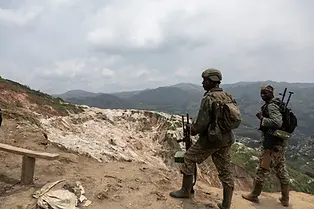
Who Benefits from the FDLR’s Return to Headlines?
DRC questions a sudden FDLR media surge in M23-held areas, warning it serves Kigali’s narrative and risks derailing fragile peace efforts.
Published:
November 13, 2025 at 4:43:34 PM
Modified:
November 13, 2025 at 4:43:34 PM
Who Benefits from the FDLR’s New “Jeremiads”? Kinshasa Questions Kigali’s Motives..
Kinshasa — A flurry of videos and statements attributed to a faction calling itself FDLR-FOCA has resurfaced online since early October, just as President Félix Tshisekedi intensified diplomacy to end Rwanda’s decades-long aggression in eastern DR Congo. Kinshasa officials and regional analysts say the timing is no coincidence: reviving the FDLR spectre helps Kigali justify a continued military footprint on Congolese soil despite international pressure.
A familiar pretext returns
For years, Rwanda has framed its security posture in North and South Kivu as a response to the FDLR, a Hutu-led group born in the DRC in 2000. The latest clips, featuring mostly young men claiming the FDLR-FOCA banner and filmed in areas currently controlled by M23/RDF, declare they will not disarm without an “inter-Rwandan dialogue.”
Congolese officials call the spectacle incongruous: if M23/RDF controls the terrain, how do purported FDLR camps operate freely and post videos without interference? If the FDLR was historically composed of ex-FAR elements from the 1990s, why do these new faces appear to be 17–30 rather than septuagenarians? The contradictions, Kinshasa argues, point to staging designed to derail diplomacy.
The wider diplomatic backdrop
The resurgence of FDLR talk comes as DR Congo pushes for implementation of UNSCR 2773, regional de-escalation, and a political track via Washington/Doha/AU channels. In parallel, Congolese forces have urged communities to cut all links with the FDLR, support voluntary disarmament and repatriation, and end the cycles of proxy warfare.
Within this context, Congolese voices say the sudden FDLR-FOCA media blitz serves one audience: Kigali. By amplifying an FDLR threat narrative, Rwanda can argue for sustained deployments in the Kivus while peace tracks gain traction — a tactic critics say has repeatedly sabotaged ceasefire efforts.
Claims and counter-claims inside the FDLR universe
Sources close to veteran FDLR figure Gen. Pacifique Ntabwunguka (“Omega”) insist the political branch is not involved with the new FOCA messaging and continues to advocate an AU-mediated inter-Rwandan dialogue. They also note past demobilisations: in the early 2000s, some FDLR tactical units reportedly laid down arms and were integrated into Rwandan structures — a reminder that the FDLR is not a monolith, and that today’s “FDLR” label is frequently misused in information wars.
The political wing’s position paper (March 2025) urged:
A non-military pathway to resolve intra-Rwandan tensions;
Safe, voluntary, supervised return for Rwandan refugees in DRC;
Inclusive dialogue under African and international mediation.
Whether one agrees with those demands or not, their stance contrasts with videos of youthful “FOCA” fighters posing in M23/RDF-held zones.
Who gains from the noise?
Kinshasa’s view is blunt: the louder the FDLR story, the easier it is to justify occupation and loot resources under the cover of “counter-insurgency.” Civil society researchers argue the fresh FOCA messaging:
Normalises M23/RDF presence while talks proceed;
Shifts headlines away from cross-border support to an ever-elastic FDLR threat;
Raises doubts around the Doha/Luanda/Nairobi tracks at sensitive moments.
Some analysts add that portraying a rejuvenated FDLR also internationalises Rwanda’s narrative before the UN Security Council and donor capitals — making it harder to sustain sanctions or a unified call for withdrawal.
Context: what the FDLR is — and isn’t
Founded in 2000, the FDLR emerged from earlier armed networks of Hutu refugees in Congo. Over time, the label has covered splinters, political and military wings, and defunct or rebranded units. Its size, cohesion, and activities have fluctuated with regional politics and Congolese operations. That fluidity makes the “FDLR threat” easy to inflate or conflate, particularly when new formations adopt old acronyms.
Congolese authorities stress two points:
Residual elements may exist, but do not justify the foreign occupation of two provinces.
The peace track requires dealing with all armed actors through disarmament, reintegration, refugee solutions, and credible guarantees — not selective narratives that excuse proxy warfare.
What Kinshasa wants next
The DRC’s position remains consistent:
Implement UNSCR 2773 and all regional communiqués fully and verifiably;
Withdraw foreign forces and dismantle supply lines to proxies;
Advance civilian protection, humanitarian access, and the return of displaced people;
Pursue political solutions where appropriate, including safe returns for bona fide refugees;
Ensure that natural-resource governance serves Congolese communities, not cross-border networks.
Officials say the goal is not to “settle scores,” but to end the pretexts that have kept the Kivus in permanent crisis.
Bottom line
The sudden visibility of “FDLR-FOCA” videos in M23/RDF-held zones raises more questions than it answers. For Kinshasa, the episode underscores a familiar pattern: weaponising narratives to prolong a military status quo. As regional and international actors press for peace, the test is whether diplomacy can move faster than the propaganda, and whether the Great Lakes can finally pivot from pretexts to proof-based de-escalation.
Tags
Keep Reading



